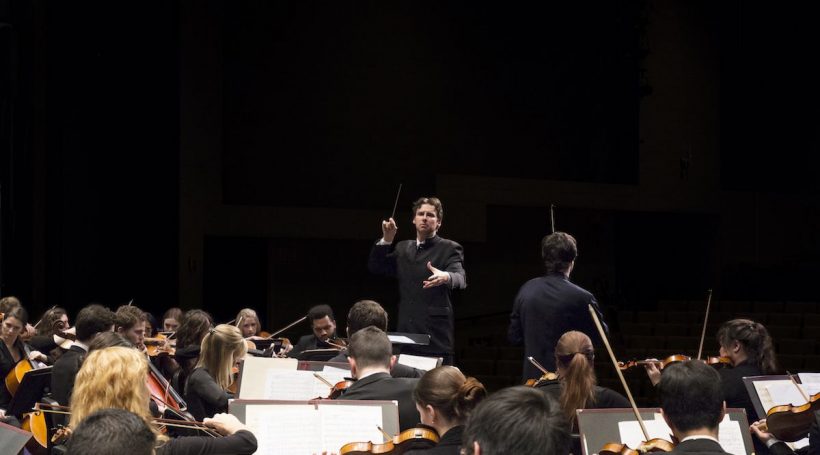Only three orchestras in the country serve as professional training grounds for aspiring musicians. It is a prestigious responsibility to take students who are considered the best in their field – who come from music schools like Julliard and Curtis – and give them the experience and practice to fine-tune their talents before moving on to a national symphony. South Jersey’s Symphony in C fills that role, as it has trained musicians who now play for world-class orchestras like the New York Philharmonic, Berlin Philharmonic and Los Angeles Philharmonic. Stilian Kirov, 34, serves as the symphony’s conductor, inspiring and educating our nation’s most talented musicians who come to South Jersey before leaping onto the global symphonic stage.
Kirov, who was born in Bulgaria, is in his third year of a four-year contract with Symphony in C, where he is charged with mentoring the young musicians and preparing intricate musical arrangements. Kirov is a sought-after musician himself, having traveled the world to lead and make guest appearances for numerous symphonies, including a showcase concert at the Salle Gaveau with the Orchestre Colonne in Paris. A graduate of Julliard, he is an accomplished pianist.
Symphony in C will close out its 2017-18 season on April 28 at Rutgers University-Camden’s Gordon Theater. As always, Kirov will meet with the audience before the concert’s start for an intimate conversation about the evening’s performance.
How do you get ready for a concert?
It really depends on what type of music I’ll be conducting. Should I conduct music that’s pretty tragic, I wouldn’t go onstage with a huge smile. Because before that, I have to put my mind into the emotional energy of the piece. If the piece is very lively, I have to, actually from the first note, bring this joyful energy, so I might even jump backstage to get my heart beating at the right pace.
In your talks before concerts, you sometimes tell stories about the conductors. What’s your favorite story?
Well, I cannot say I’m very excited about this story, but there is one famous composer who was also a conductor, who killed himself with his baton. His name is Jean-Baptiste Lully, and he’s considered one of the first conductors. So he was conducting with basically this big stick he would move up and down, and he accidentally stuck himself in the foot. This was a long, long time ago, this was very early music and they didn’t have medicine, so his leg got infected and he died.
Do you ever put your own spin on an arrangement, or is a classic a classic?
Ideally, you should be following what’s in the score, but sometimes you play arrangements where you could make some adjustments. I like to start a year in advance. So say, for example, I’m going to perform a symphony coming up, I would have started last year to learn it, then I let it sit a little bit. I want to put the score on the shelf and live with it, and come back to it two or four months before the performance. Then I can get into it by the time I get to the show.
Do you have a favorite piece?
Everything I’m conducting tonight. That’s, of course, the diplomatic answer. You have to be in the mindset that everything you do is the best work ever written, so you can present it in the best possible way. But I have many, many passions and interests from the music of Beethoven and Mozart and the classics to the Russian romantics and the German romantics. I really like American music as well. I love everything that has strong artistic integrity.
What’s something difficult about being a conductor?
The leadership is a challenging aspect. When you come to the podium, the orchestra knows what you can and cannot do within probably five minutes. You’re like an open book, almost immediately.
You are an accomplished pianist. What do you love more about conducting than playing music?
In conducting, the question is not so much what you can get but what you can give. You have to approach it from this perspective. What I really like about conducting is we’re building something together with 50, 60, 70, 150 other musicians. It’s extremely, extremely special, and it’s something that was always inspiring to me. Another inspiring aspect was the limitless possibility of sound color that I’m exposed to daily from all the different instruments in a full orchestra.
How many people audition to be in Symphony in C?
More than 260 people auditioned this year for 20 spots, so it’s a big marathon for us. But I have to tell you, I never get tired. I discover every year how much talent there is out there and how many wonderful musicians there are. I joke sometimes and say, “We probably need three or four orchestras,” because we hear so many people who are quite extraordinary.
You’ve performed all over the world; what were some of the most memorable experiences?
I recently made a debut at Berlin Philharmonic Hall, and this is something that was very memorable to me because Berlin Philharmonic is the top concert hall in the world. I would put Berlin Philharmonic and Carnegie Hall together, and I performed in both. When you go to these wonderful places, you feel the spirits of the great music masters that have performed there. It’s a very unique experience. It was very special.
Symphony in C performed an unprecedented concert last year in Philadelphia, performing with the historic Wanamaker Organ at what is now Macy’s. What was it like conducting the 107-year-old organ?
We were on a platform and the organist played across the room on the other side of Macy’s, so we communicated through a camera. I conducted with the orchestra closely, but the organist sees me through a camera, and I have a camera to be able to see him as well. It’s a visual exchange simply because of the logistics; we are far from each other. It was a very exciting process to bring this piece to life.
Many musicians get their start at Symphony in C. Where do they go after that?
When I was studying in New York, Symphony in C was known as one of the top ensembles. Our players are the future musical leaders of tomorrow.
We have an alumni page on our website, and if you open it, you’ll probably see every major orchestra: Berlin Philharmonic, National Symphony Orchestra, Toronto Symphony, Rochester Philharmonic, Philadelphia Orchestra, New York Philharmonic, Chicago Symphony, Sarasota Orchestra, Los Angeles Philharmonic. Every big orchestra in the United States and also around the world has a Symphony in C member. We’re extremely, extremely proud of that.
Win at the Symphony!
You can win 2 tickets to Symphony in C’s final concert of the season on April 28 at the Gordon Theater at Rutgers University-Camden! One winner will be randomly selected on April 17. Click here to enter.














